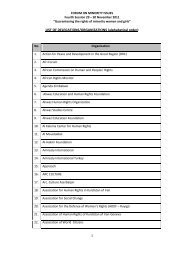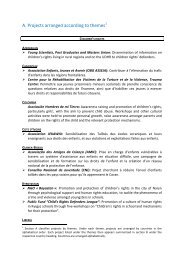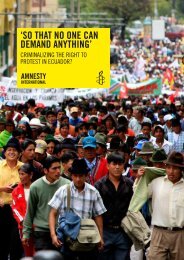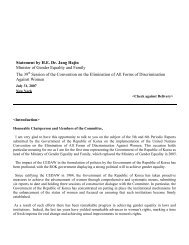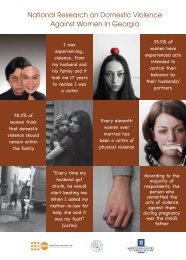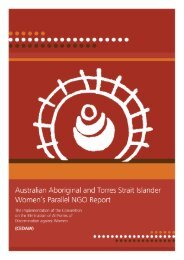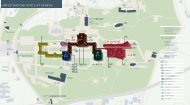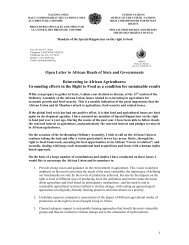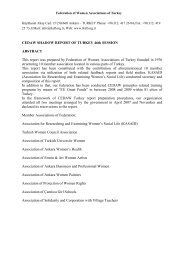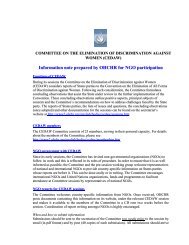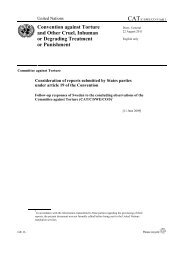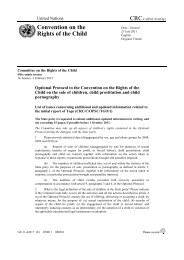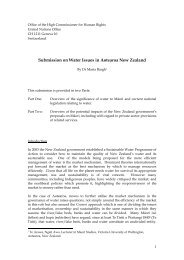Report - Office of the High Commissioner on Human Rights
Report - Office of the High Commissioner on Human Rights
Report - Office of the High Commissioner on Human Rights
- No tags were found...
Create successful ePaper yourself
Turn your PDF publications into a flip-book with our unique Google optimized e-Paper software.
– The role <str<strong>on</strong>g>of</str<strong>on</strong>g> <str<strong>on</strong>g>the</str<strong>on</strong>g> media in reporting <strong>on</strong> l<strong>on</strong>ggrass issues: The negative reporting by <str<strong>on</strong>g>the</str<strong>on</strong>g> media has<br />
actively aggravated racial tensi<strong>on</strong> and violence, as well as reinforced racial prejudices and<br />
stereotypes. In March/April 2003, <str<strong>on</strong>g>the</str<strong>on</strong>g>re was a particularly aggressive campaign by <str<strong>on</strong>g>the</str<strong>on</strong>g> media<br />
against <str<strong>on</strong>g>the</str<strong>on</strong>g> l<strong>on</strong>ggrass people, during which <str<strong>on</strong>g>the</str<strong>on</strong>g> abhorrent idea <str<strong>on</strong>g>of</str<strong>on</strong>g> ‘permits for Aboriginals’ was<br />
even raised. The fear campaigns are particularly str<strong>on</strong>g around <str<strong>on</strong>g>the</str<strong>on</strong>g> time <str<strong>on</strong>g>of</str<strong>on</strong>g> <str<strong>on</strong>g>the</str<strong>on</strong>g> Nor<str<strong>on</strong>g>the</str<strong>on</strong>g>rn Territory<br />
electi<strong>on</strong>s and are very effective in gaining votes for right wing political parties;<br />
– A series <str<strong>on</strong>g>of</str<strong>on</strong>g> by-laws are introduced to prevent l<strong>on</strong>ggrass people living in public spaces (e.g. issuing<br />
<str<strong>on</strong>g>of</str<strong>on</strong>g> fines for sleeping between dusk and dawn, for lighting a fire, or for leaving your possessi<strong>on</strong>s<br />
in a public spaces). In additi<strong>on</strong> people’s access to basic services are removed (e.g. cut taps <str<strong>on</strong>g>of</str<strong>on</strong>g>f in<br />
public spaces (<str<strong>on</strong>g>the</str<strong>on</strong>g> Council brings <str<strong>on</strong>g>the</str<strong>on</strong>g>ir own tap attachments), public toilets are locked up), with<br />
<str<strong>on</strong>g>the</str<strong>on</strong>g> result that many l<strong>on</strong>ggrass people have to walk l<strong>on</strong>g distances to bring water for <str<strong>on</strong>g>the</str<strong>on</strong>g>ir camps.<br />
Dulcie Malimara (Uinawinga Project)<br />
I have been in Darwin since I was 17. I had all my kids in Darwin. Even my bro<str<strong>on</strong>g>the</str<strong>on</strong>g>r, he is<br />
blind…we’ve been staying in Darwin all our lives. Anyway, we had a Housing Commissi<strong>on</strong> house<br />
for nearly 19 years. I had an injured neck and injured leg and went to hospital. My kids were<br />
staying in <str<strong>on</strong>g>the</str<strong>on</strong>g> house, but nobody was looking after <str<strong>on</strong>g>the</str<strong>on</strong>g>m. So some <str<strong>on</strong>g>of</str<strong>on</strong>g> my people come al<strong>on</strong>g. I<br />
told my people not to make noise because that wasn’t my house. But <str<strong>on</strong>g>the</str<strong>on</strong>g>y made a lot <str<strong>on</strong>g>of</str<strong>on</strong>g> noise<br />
so I got kicked out. I was in <str<strong>on</strong>g>the</str<strong>on</strong>g> hospital when my kids got kicked out. When I came out <str<strong>on</strong>g>the</str<strong>on</strong>g>y<br />
wasn’t <str<strong>on</strong>g>the</str<strong>on</strong>g>re. And that’s my big problem. I didn’t want to go back in <str<strong>on</strong>g>the</str<strong>on</strong>g> Housing Commissi<strong>on</strong>.<br />
I’m happy staying outside so I can sing, dance, cry, whatever I like. So I’m free enough to stay<br />
here. The Housing Commissi<strong>on</strong>, its really hard. You can’t even take your family. It’s really hard<br />
for us to go back in a Housing Commissi<strong>on</strong>, because I tried that a lot <str<strong>on</strong>g>of</str<strong>on</strong>g> times. That’s my story.<br />
Dulcie and her sisters and bro<str<strong>on</strong>g>the</str<strong>on</strong>g>r were born in Arnhemland during and just after World War II. Some<br />
moved as children or young teenagers to Darwin in <str<strong>on</strong>g>the</str<strong>on</strong>g> 1950s. They retain c<strong>on</strong>necti<strong>on</strong>s with <str<strong>on</strong>g>the</str<strong>on</strong>g>ir home<br />
country near Maningrida, and have some traditi<strong>on</strong>al resp<strong>on</strong>sibility for certain lands <str<strong>on</strong>g>the</str<strong>on</strong>g>re, but <str<strong>on</strong>g>the</str<strong>on</strong>g>y<br />
have been Darwin residents for decades. Dulcie has lived in Darwin since 1966, when she went into<br />
Royal Darwin Hospital to bear her first child Marietta (now 32 years old). She has been a permanent<br />
Darwin resident for 32 years and brought up all her children here.<br />
When she moved to Darwin, Dulcie lived in a caravan park <strong>on</strong> <str<strong>on</strong>g>the</str<strong>on</strong>g> outskirts <str<strong>on</strong>g>of</str<strong>on</strong>g> Darwin, and <str<strong>on</strong>g>the</str<strong>on</strong>g>n moved<br />
to ano<str<strong>on</strong>g>the</str<strong>on</strong>g>r. After cycl<strong>on</strong>e Tracey (1974) <str<strong>on</strong>g>the</str<strong>on</strong>g> Housing Commissi<strong>on</strong> built houses for low-income people<br />
and provided Dulcie’s immediate family with a house in Moil suburb. Dulcie lived in that house for<br />
many years until she went to hospital. Family members came to Darwin to visit her in hospital and<br />
look after her young children, and stayed in her house. No-<strong>on</strong>e ensured rent was paid. The visiting<br />
family members, un-accustomed to high-density living, caused too much noise. Dulcie’s family was<br />
evicted. When she left hospital she was homeless.<br />
She and o<str<strong>on</strong>g>the</str<strong>on</strong>g>r members <str<strong>on</strong>g>of</str<strong>on</strong>g> her group have come toge<str<strong>on</strong>g>the</str<strong>on</strong>g>r at or been dispersed to various underdeveloped<br />
areas around Darwin. This has included lengthy stays at Lee Point (twice) and Marrara Creek and<br />
o<str<strong>on</strong>g>the</str<strong>on</strong>g>r publicly owned land in <str<strong>on</strong>g>the</str<strong>on</strong>g> hands <str<strong>on</strong>g>of</str<strong>on</strong>g> <str<strong>on</strong>g>the</str<strong>on</strong>g> Comm<strong>on</strong>wealth or Territory government agencies, which<br />
have generally moved <str<strong>on</strong>g>the</str<strong>on</strong>g>m <strong>on</strong> after a few m<strong>on</strong>ths. They were evicted very publicly from Lee Point<br />
a few years ago as trespassers.<br />
EXECUTIVE SUMMARY 197



